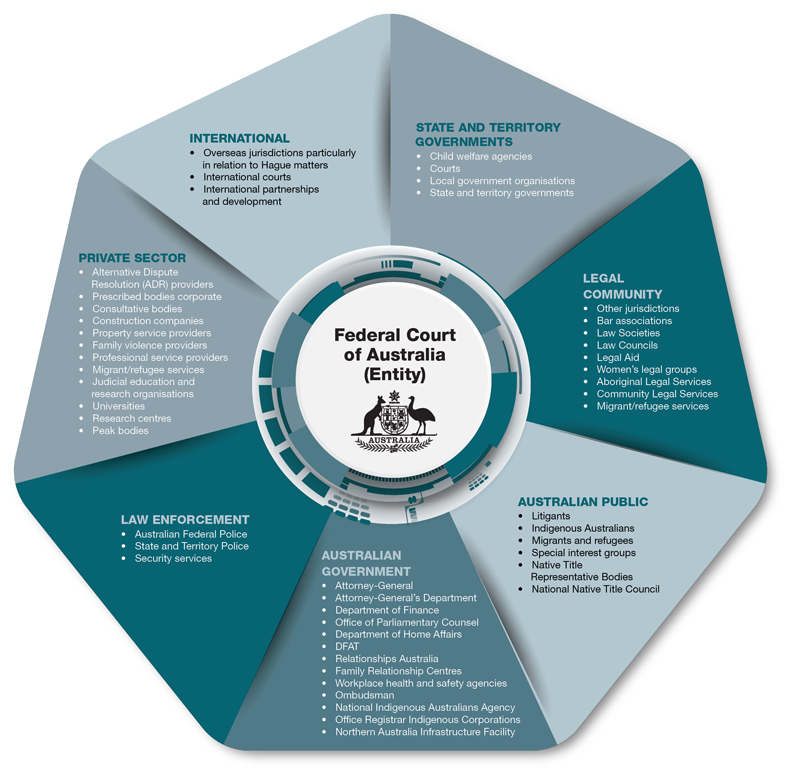Cooperation
Corporate Plan 2020-2021
Our relationships are essential to help us achieve our purpose. Successful engagement and collaboration helps to contribute to more effective connection of services, better cooperation and sharing of information and improved service delivery.
As an entity, we work collaboratively with a broad range of stakeholders, including the legal profession, government agencies, other courts, non-Government organisations, research, academia and community groups, to build partnerships to promote access to justice, early engagement with products and services, and more effective information to assist Court and Tribunal users.
As independent Courts and a Tribunal, we each have different stakeholders and partnerships that underpin the broader entity structure. For the Courts, relationships are managed either by the Chief Justice, Chief Judge, other judges or the respective CEO and Principal Registrar on behalf of the Chief Justice and Chief Judge. For the Tribunal, relationships are managed by the President or the Registrar and Members on behalf of the President.
Over the four years of this plan, the Courts and the Tribunal will focus on sustaining engagement and cooperation by continuing to build on our highly successful partnerships and working collaboratively to build new ones.
The Federal Court engages in a wide range of activities with the legal profession, including regular user group meetings. The aim of user groups is to provide a forum for court representatives and the legal profession to discuss existing and emerging issues, provide feedback to the Court and act as a reference group. Seminars and workshops on issues of practice and procedure in particular areas of the Court’s jurisdiction are also regularly held. Registries host advocacy sessions, bar moot courts and moot competitions and assist with readers’ courses.
Court facilities are made available for many events for the legal community, including lectures, seminars and ceremonies. Registries regularly host visiting delegations from overseas courts who are interested in learning more about the Court’s operations. The Court is also an active supporter of legal education programs, both in Australia and overseas.
The Court also regularly engages with the Law Council of Australia, the Australian Bar Association, and the various state and territory bar associations and law societies.
The Federal Court continues to coordinate a number of projects and activities to support governance, access to justice and the rule of law within neighbouring judiciaries. By collaborating with other courts, predominantly across the Asia Pacific region, the Court is able to contribute to a number of our partners’ important reform and development priorities. Detailed information on this is published in the Court’s annual report.
The Court’s Marshal and Sheriff continues to work closely with the Australian Federal Police and the police services of the states and territories. This is particularly important in the execution of orders emanating from family law matters such as the recovery of children, the arrest of persons and the prevention of parties leaving Australia when ordered not to do so. The Marshal and Sheriff also works closely with the Australian Federal Police, the police services of the states and territories and the Attorney-General’s Department on a range of information exchange arrangements in order to improve the Courts’ understanding of risks associated with individuals coming to Court.
The National Native Title Tribunal continues to work with stakeholders, particularly representative bodies, governments at all levels, peak bodies and prescribed bodies corporate. The President, Members and Registrar have established a fresh engagement agenda, including development of a renewed working relationship with the Federal Court to ensure the most effective use of resources.
A Protocol facilitates the performance of Court and Tribunal native title roles and builds upon the close existing relationship. The Tribunal conducts information sessions around the country to assist stakeholders in understanding their legal obligations and the need for compliance with the future act provisions of the Act.
The Family Court and Federal Circuit Court have numerous external stakeholders, some of which include Bars and Law Societies, the Australian Bar Association, the Law Council of Australia and the Family Law Section of the Law Council of Australia. Engagement and ongoing collaboration also occurs with Legal Aid organisations, women’s legal groups, Aboriginal Legal Services, migrant and refugee services, community legal services, child welfare agencies, the Australian Federal Police, state and territory police, overseas jurisdictions, Relationships Australia, Family Relationship Centres, alternative dispute resolution providers and judicial education and research organisations.
There are several established channels through which external stakeholders may inform the Family Court and Federal Circuit Court and provide feedback, including the following:
- The Australian Institute of Family Studies was established under s 114B of the Family Law Act and is a forum for exchange of information and research.
- The Chief Justice meets regularly with key representatives of national and state bar associations and law societies. In addition, the Federal Circuit Court has established relationships with bar associations, law societies and key stakeholders in regards to migration and other general federal law matters.
The Family Court also has a commitment to participate in the Australian Awards program to help develop and strengthen access to justice for family law litigants in Pacific nations.
Both the Family Court and Federal Circuit Court have a number of strategies for strengthening partnerships with stakeholders, such as legal practitioners, non-government organisations, and government agencies and departments. Judges regularly present to law societies and bar associations in their respective jurisdictions, as well as hold informal meetings with members of the legal profession and participate in stakeholder meetings. Judges are often asked to speak at secondary schools and lecture at law schools about particular topics and their work generally.
Staff continue to regularly engage with numerous external groups such as local family law pathways networks, legal aid, bar associations and law societies, local practitioners and practitioners’ associations, community legal centres, family relationship centres, community organisations and support groups, child protection agencies, family violence committees and organisations, state courts, universities and police services.
The diagram below is a high-level depiction of the interconnection of relationships and stakeholders of the Courts and Tribunal across the entity.










